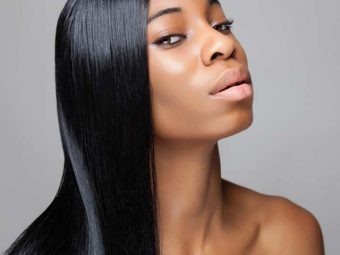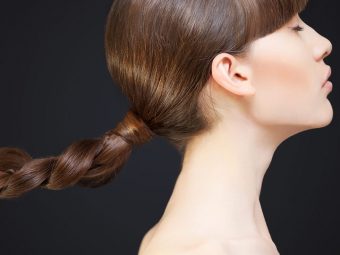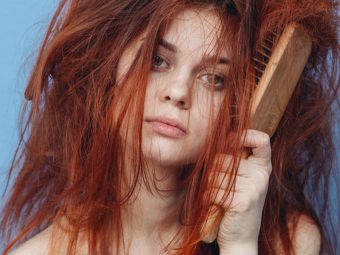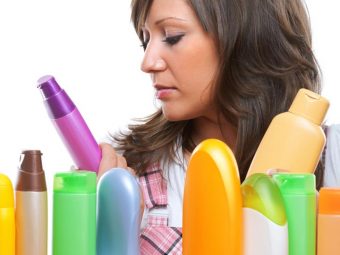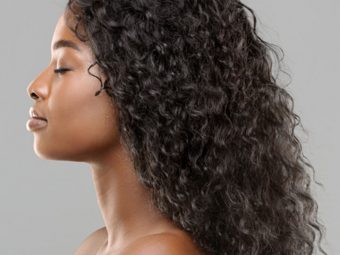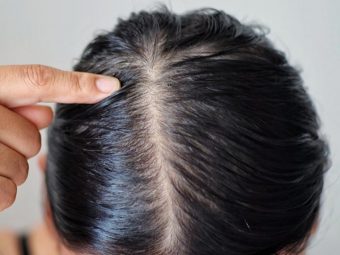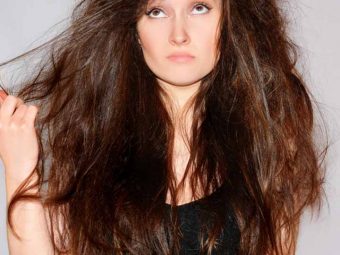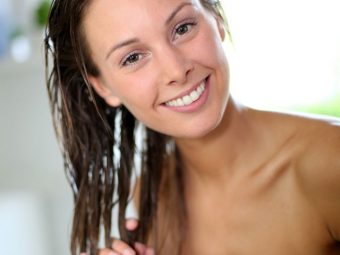Hormonal Hair Loss: Causes And How To Reduce It Naturally
Know why your endocrine system could be acting up, making you lose your precious tresses.
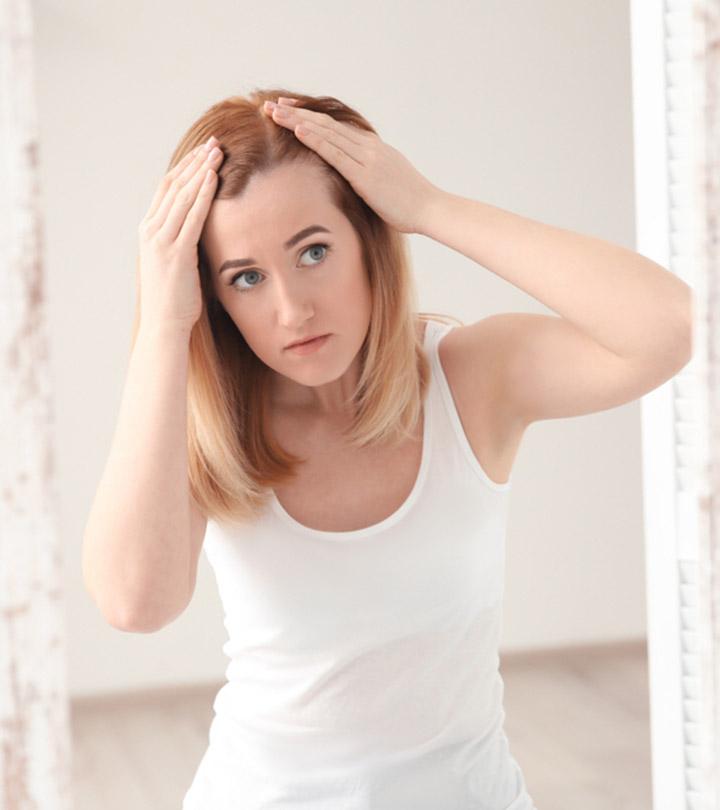
Hormonal hair loss occurs because abnormal hormone levels influence hair growth patterns (1). During pregnancy, menopause, or anywhere in between, women experience a lot of stress. Hormonal imbalances caused by stress can lead to hair loss. This may make many conscious of themselves. However, it is possible to restore your hair to its former glory.
You can reduce hair loss by taking a few simple steps. First, you need to stay patient and maintain a regular hair care routine. The first step in this journey is understanding which hormones contribute to hair loss and how. Keep reading to learn more.
In This Article
5 Hormones That Cause Hair Loss
1. Testosterone
Testosterone is the male sex hormone. However, testosterone is present in negligible amounts in women too. Due to underlying issues like poor diet, genetics, and PCOS, sometimes women may produce excessive amounts of testosterone. Facial hair, obesity, and female pattern hair loss are common symptoms of excessive production of testosterone.
Testosterone gets converted to DHT (dihydrotestosterone) catalyzed by the enzyme, 5-alpha reductase. Excessive amounts of DHT causes hair loss in women (2). One of the ways to reduce testosterone naturally is to lose weight (3). Talk to a doctor about treatment options.
Note: Finasteride is not recommended for women of childbearing age.
2. Pregnancy Hormones
About 40-50% of women experience excessive hair shedding from one to five months of pregnancy. This hair loss, known as telogen effluvium, occurs due to changes in estrogen and progesterone levels (4). Androgenic alopecia (female pattern hair loss) also occurs in women after childbirth (5).
3. Thyroid Hormones
Hypothyroidism or hyperthyroidism can cause hair loss (6). They can cause an autoimmune condition called alopecia areata in women. Alopecia areata is characterized by circular pattern hair loss. PCOS (polycystic ovarian syndrome) is also an autoimmune thyroid condition that causes diffused hair loss (7).
4. Menopause Hormones
Menopause can also impact the hair growth cycle in women, especially if androgenic alopecia was already diagnosed prior to hitting menopause. Changes in sex hormones and an increase in stress-associated hormones lead to female pattern hair loss during and after menopause (8), (9).
5. Stress Hormones
Stress associated with pregnancy, delivery, menopause, or any other factors can lead to the secretion of cortisol. This stress hormone affects the cell cycle of hair follicles (10), (11).
These are the various hormones that cause hair loss. So, how can you reduce or restore hormonal balance to regrow your hair? The good news is, you can reduce hormonal hair loss naturally. Scroll down to find out how.
How To Reduce Hormonal Hair Loss Naturally
- Change Up Your Diet
To balance the hormones and improve hair growth, it is extremely important to change your diet. Clean and healthy food always has a positive impact on your body and mind. It is absolutely necessary to stay away from all the sugary treats, salty foods, and foods laden with trans fats (candy, burger, pizza, fries, pretzels, etc.). Heres what you should be eating instead:
Vegetable: Spinach, bok choy, arugula, cabbage, lettuce, chard, radish greens, beetroot, carrot, broccoli, tomato, cucumber, asparagus, radish, turnip, and pumpkin.
Fruits: Apple, peach, orange, lemon, grapefruit, apricot, prune, papaya, pineapple, tangerine, nectarine, watermelon, muskmelon, and avocado.
Protein: Eggs, mackerel, tuna, salmon, haddock, basa, ground turkey, lean beef, chicken breast, organ meat, kidney beans, garbanzo beans, lentils, soybean, and tofu.
Dairy: Milk, cheese, buttermilk, and yogurt.
Seeds And Nuts: Pepita, sunflower seeds, flax seeds, almond, walnuts, and cashew.
Fats And Oils: Olive oil, avocado oil, and clarified butter (ghee).
- Get A Head Massage
Head massage is said to work well for stimulating hair growth, though this claim has not been substantiated by any scientific research. Massage your entire head and neck with coconut oil or almond oil gently in a circular motion for 10-15 minutes at least twice a week. It helps improve blood circulation, which helps the nutrients to reach the hair roots. Head massage also helps you relax, an additional value for people going through a significant life ch[ ange.
- Apply A Hair Mask Every Week
You have to tackle the problem of hair loss due to hormonal imbalance internally as well as externally. This means, apart from changing your diet, you must also take care of your scalp and hair health externally. The easiest way to do so is to apply a hair mask once every week. Here are a few hair masks that work well for inducing hair growth:
Coconut Oil And Castor Oil: Mix equal parts of coconut oil and castor oil. Massage the oil into your scalp and hair. Wear a shower cap and wait for 45 minutes. Wash off the oil with shampoo and conditioner.
Egg White Mask: Crack an egg and separate the white and the yolk. Lightly beat the egg white. Section your hair and apply the egg white from the roots to the tips with a brush. Wear a shower cap and wait for 30 minutes before washing it off.
Henna Mask: Mix 5-7 tablespoons of henna with 2 tablespoons of shikakai and 1 tablespoon of reetha. Add warm water and mix it. Let it steep overnight. Apply coconut oil to your hair. Section your hair and use a brush to apply the henna hair mask from the roots to the tips. Wait for 60 minutes before washing it off.
Note: Henna imparts an orangish tinge to the hair. Do not use it if you have blonde or colored hair. Just use shikakai and reetha instead.
Aloe Vera And Lemon Juice: Mix 3 tablespoons of aloe vera with 1 tablespoon lemon juice. Apply it to your scalp. Massage your scalp gently in a circular motion for 10 minutes. Wait for 20 minutes before washing it off.
- Do Yoga For Hormone Balancing
Yoga, especially Sirsasana (head stand), is said to be amazing for hair growth. It increases blood circulation and enables the hair follicles to be nourished with the nutrients that boost hair growth. Yoga is also helpful for restoring hormonal balance. Kapalbhati, Anulom Vilom, baby pose, and Surya Namaskar are a few yoga poses that can help improve your hair health.
- Do Any Form Of Exercise Regularly
Apart from yoga, you must include some form of exercise into your daily routine. Go for Zumba, kickboxing, HIIT, walking, running, swimming, or any other sports to keep physically and mentally fit. Exercising helps secrete serotonin, which helps reduce stress and inflammation in the body. Thats why we feel good after taking a walk at the end of the day. Hormonal imbalance caused due to improper diet or any other factor can be reduced significantly if you exercise regularly.
- Drink Adequate Water
Water helps flush out toxins and improve the circulation of the nutrients required for good hair growth. Drink at least 2-3 liters of water every day. If you work out, drink 3-4 liters of water. You can also add water to your system by consuming freshly pressed fruit juice, fruits, and detox drinks.
- Sleep Well Every Night
Pregnancy, menopause, additional stress at work or home, and sleep deprivation cause cortisol secretion. This, in turn, causes chronic inflammation due to toxin build-up. Getting sound sleep for 7-8 hours is best to reduce inflammation and allow the hair follicles to complete the growth cycle and prevent premature termination of hair growth.
To recap, a change or fluctuation in hormone levels may lead to serious hair loss. When you are pregnant, facing menopause, or dealing with stress, your hormone levels change. The hormones that are commonly known to cause hair loss are testosterone, pregnancy hormones, thyroid hormones, menopausal hormones, and stress hormones. There are a few tips you can use to reduce hormonal hair loss naturally, like changing your diet, massaging your head, applying hair masks regularly, and trying yoga for hormonal balance. Try to relieve stress and get enough sleep on a daily basis as well.
Frequently Asked Questions
How do I know I have a hormonal imbalance?
Some hormonal imbalances have prominent signs, like changes in facial hair and obesity. Pregnancy, menopause, and increased stress at work or home can also trigger hormonal imbalance. However, we recommend you see a doctor to determine if your hair loss is due to hormonal imbalance.
How long does it take for hair to grow back after hormonal hair loss?
It takes 6 months to about a year (or more) to grow your hair back from hormonal hair loss. Dont lose heart because you can reduce hair loss and regrow your hair if you take proper care of your diet and lifestyle. Also, consult a doctor to seek the best treatment.
Key Takeaways
- Disturbances in sex, stress, thyroid, and other hormones may lead to heavy hair loss.
- A balanced diet, regular physical activity, and a good hair care routine can help reverse hair loss.
- Certain yoga poses help improve blood circulation to hair follicles and achieve hormonal balance.
References:
Articles on StyleCraze are backed by verified information from peer-reviewed and academic research papers, reputed organizations, research institutions, and medical associations to ensure accuracy and relevance. Read our editorial policy to learn more.
- Hormonal Effects on Hair Follicles
https://www.ncbi.nlm.nih.gov/pmc/articles/PMC7432488/ - Alopecia in Women
.https://www.aafp.org/afp/2003/0301/p1007.html#:~:text=The%20currently%20preferred%20treatment%20for,it%20enlarges%20the%20actual%20follicles - Hair loss in women
https://pubmed.ncbi.nlm.nih.gov/19341939/ - Pregnancy and Hair Loss
https://americanpregnancy.org/healthy-pregnancy/pregnancy-health-wellness/hair-loss-during-pregnancy-973/ - Estrogen and progesterone receptors in androgenic alopecia versus alopecia areata
https://pubmed.ncbi.nlm.nih.gov/9557785/ - Thyroid Hormones Directly Alter Human Hair Follicle Functions: Anagen Prolongation and Stimulation of Both Hair Matrix Keratinocyte Proliferation and Hair Pigmentation
https://academic.oup.com/jcem/article/93/11/4381/2627273 - Hair loss and thyroid disorders
https://www.btf-thyroid.org/hair-loss-and-thyroid-disorders - Alterations in Hair Follicle Dynamics in Women
https://www.ncbi.nlm.nih.gov/pmc/articles/PMC3884776/ - Hair loss in elderly women
https://pubmed.ncbi.nlm.nih.gov/20172841/ - Stress and the Hair Growth Cycle: Cortisol-Induced Hair Growth Disruption
https://pubmed.ncbi.nlm.nih.gov/27538002/ - Hair and stress: A pilot study of hair and cytokine balance alteration in healthy young women under major exam stress
https://www.ncbi.nlm.nih.gov/pmc/articles/PMC5397031/




